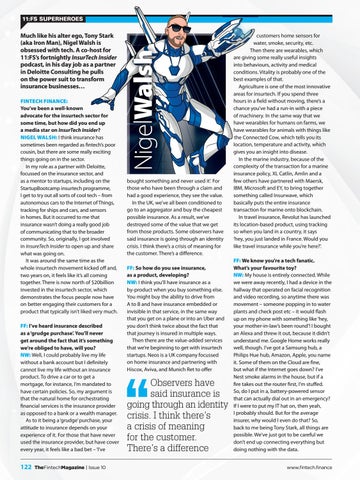Much like his alter ego, Tony Stark (aka Iron Man), Nigel Walsh is obsessed with tech. A co-host for 11:FS’s fortnightly InsurTech Insider podcast, in his day job as a partner in Deloitte Consulting he pulls on the power suit to transform insurance businesses… FINTECH FINANCE: You’ve been a well-known advocate for the insurtech sector for some time, but how did you end up a media star on InsurTech Insider? NIGEL WALSH: I think insurance has sometimes been regarded as fintech’s poor cousin, but there are some really exciting things going on in the sector. In my role as a partner with Deloitte, focussed on the insurance sector, and as a mentor to startups, including on the StartupBootcamp insurtech programme, I get to try out all sorts of cool tech – from autonomous cars to the Internet of Things, tracking for ships and cars, and sensors in homes. But it occurred to me that insurance wasn’t doing a really good job of communicating that to the broader community. So, originally, I got involved in InsureTech Insider to open up and share what was going on. It was around the same time as the whole insurtech movement kicked off and, two years on, it feels like it’s all coming together. There is now north of $20billion invested in the insurtech sector, which demonstrates the focus people now have on better engaging their customers for a product that typically isn’t liked very much. FF: I’ve heard insurance described as a ‘grudge purchase’. You’ll never get around the fact that it’s something we’re obliged to have, will you? NW: Well, I could probably live my life without a bank account but I definitely cannot live my life without an insurance product. To drive a car or to get a mortgage, for instance, I’m mandated to have certain policies. So, my argument is that the natural home for orchestrating financial services is the insurance provider as opposed to a bank or a wealth manager. As to it being a ‘grudge’ purchase, your attitude to insurance depends on your experience of it. For those that have never used the insurance provider, but have cover every year, it feels like a bad bet – ‘I’ve
122
TheFintechMagazine | Issue 10
NigelWalsh
11:FS SUPERHEROES
bought something and never used it’. For those who have been through a claim and had a good experience, they see the value. In the UK, we’ve all been conditioned to go to an aggregator and buy the cheapest possible insurance. As a result, we’ve destroyed some of the value that we get from those products. Some observers have said insurance is going through an identity crisis. I think there’s a crisis of meaning for the customer. There’s a difference. FF: So how do you see insurance, as a product, developing? NW: I think you’ll have insurance as a by-product when you buy something else. You might buy the ability to drive from A to B and have insurance embedded or invisible in that service, in the same way that you get on a plane or into an Uber and you don’t think twice about the fact that that journey is insured in multiple ways. Then there are the value-added services that we’re beginning to get with insurtech startups. Neos is a UK company focussed on home insurance and partnering with Hiscox, Aviva, and Munich Ret to offer
Observers have said insurance is going through an identity crisis. I think there’s a crisis of meaning for the customer. There’s a difference
customers home sensors for water, smoke, security, etc. Then there are wearables, which are giving some really useful insights into behaviours, activity and medical conditions. Vitality is probably one of the best examples of that. Agriculture is one of the most innovative areas for insurtech. If you spend three hours in a field without moving, there’s a chance you’ve had a run-in with a piece of machinery. In the same way that we have wearables for humans on farms, we have wearables for animals with things like the Connected Cow, which tells you its location, temperature and activity, which gives you an insight into disease. In the marine industry, because of the complexity of the transaction for a marine insurance policy, XL Catlin, Amlin and a few others have partnered with Maersk, IBM, Microsoft and EY, to bring together something called Insurwave, which basically puts the entire insurance transaction for marine onto blockchain. In travel insurance, Revolut has launched its location-based product, using tracking so when you land in a country, it says ‘hey, you just landed in France. Would you like travel insurance while you’re here?’. FF: We know you’re a tech fanatic. What’s your favourite toy? NW: My house is entirely connected. While we were away recently, I had a device in the hallway that operated on facial recognition and video recording, so anytime there was movement – someone popping in to water plants and check post etc – it would flash up on my phone with something like ‘hey, your mother-in-law’s been round’! I bought an Alexa and threw it out, because it didn’t understand me. Google Home works really well, though. I’ve got a Samsung hub, a Philips Hue hub, Amazon, Apple, you name it. Some of them on the Cloud are fine, but what if the Internet goes down? I’ve Nest smoke alarms in the house, but if a fire takes out the router first, I’m stuffed. So, do I put in a, battery-powered sensor that can actually dial out in an emergency? If I were to put my IT hat on, then yeah, I probably should. But for the average insurer, why would I even do that? So, back to me being Tony Stark, all things are possible. We’ve just got to be careful we don’t end up connecting everything but doing nothing with the data. www.fintech.finance
